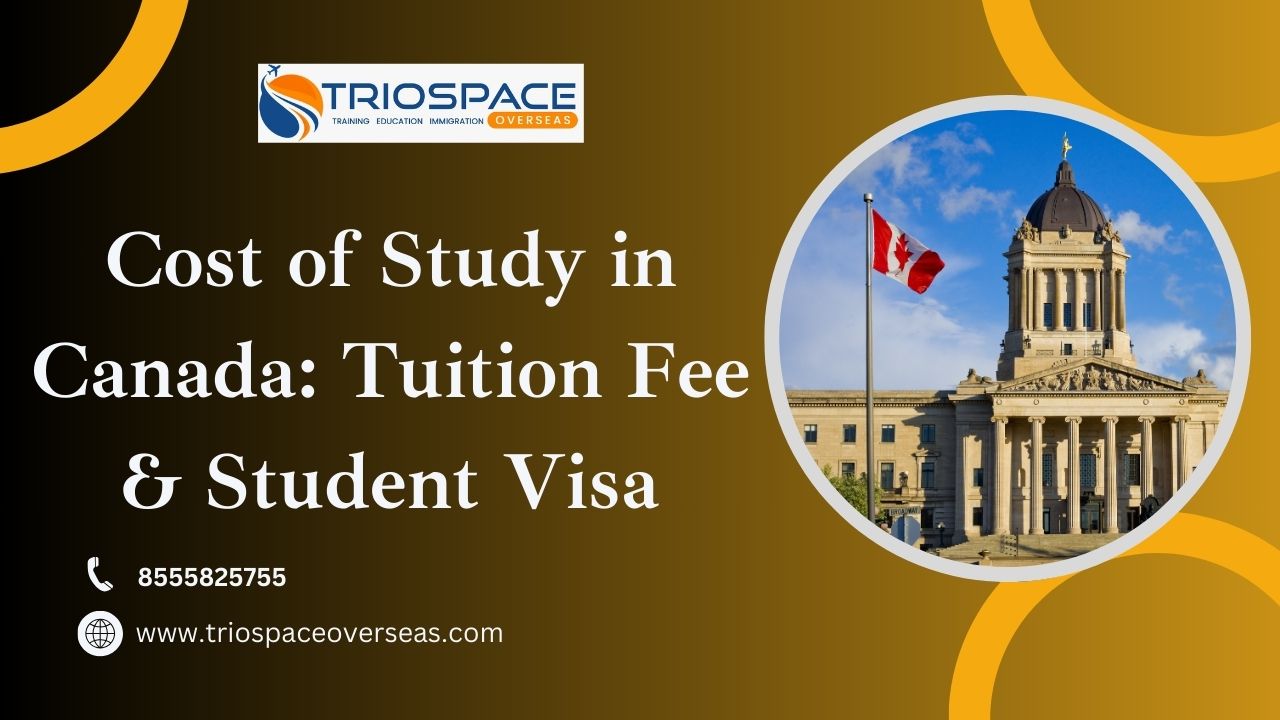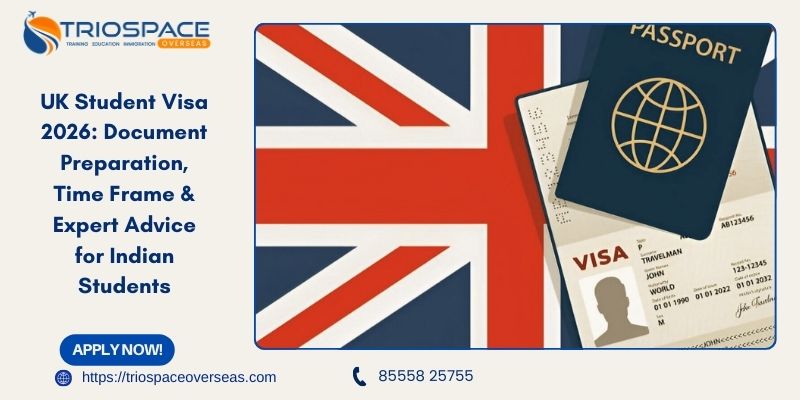
Cost of Study in Canada: Tuition Fee & Student Visa
- Key Factors Affecting the Cost of Education in Canada
- Cost Of Study In Canada For International Students
- The total cost of Study in Canada includes living expenses.
- Additional Important Expenses of Study in Canada
- Pre- and Post-arrival costs make up the total cost of Study in Canada
Are you feeling overwhelmed by the idea of funding for an international Canadian degree on your own? Do not worry! Join us with a top study abroad consultancy in Hyderabad as we go over a detailed cost blueprint, from tuition fees to student permits, designed to help you plan your budget without becoming overwhelmed. Learn how to hack airfares, reduce living expenses, score generous scholarships, and calculate correct currency changes.
Key Factors Affecting the Cost of Education to Study in Canada
Prior to diving into every aspect of the overall expenses, let us examine the cost of education to Study in Canada from an Indian perspective. What additional fees will you spend in addition to the typical cost of Study in Canada? As indicated by the table below, there will be two stages to your costs. The first is applying to the Canadian university of your dreams. Second, after your student application is approved, you relocate to Canada to start your studies.
| Type of Expense | Cost |
| IELTS/TOEFL (one-time) | INR 15,500 (CAD 254) |
| Purchase of GIC (one-time) | INR 6,10,600 (CAD 10,000) |
| Tuition fee (per annum) | CAD 18,227 (INR 11,13,000) |
| Application Fee (one-time) | INR 10,000 (CAD 162) |
| Application for student visa (one-time) | INR 9,200 (CAD 150) |
| Visa Procedure (one-time) | INR 4,500 (CAD 73) |
| Flight tickets (to Canada) | INR 1,00,000 – 2,00,000 (CAD 1,623 – 3,247) |
| Living expenses (per year) | INR 5,00,000 (CAD 8,117) |
| Total | INR 32,69,800 (CAD 53,087) (approx.) |
Note: The costs indicated in the table are the most accurate estimates based on the present circumstances. Tuition, application fees, and living expenditures vary based on the course, college, and lifestyle choices. The main variables that determine the cost of studying in Canada are listed below.
- The cost of Study in Canada for International students.
- Living expenditures while Study in Canada.
- Additional costs of Study in Canada.
- Pre-arrival and post-arrival costs.
Cost Of Study In Canada For International Students
The typical Canadian fees for international students enrolling in undergraduate (UG) and graduate (PG) programs are listed below. For foreign students enrolling in a first-year course in Canada, this is the standard tuition. An installment of this will be due at the time of admittance, and the entire amount must be paid when you get to Canada. As per Statistics Canada, the information displayed in the table below is correct for the years 2024 – 2025.
| Program | Average Tuition Fee in Canada |
| Undergraduate | CAD 20,00 – CAD 30,000 per annum |
| Postgraduate | CAD 7,000 – CAD 21,000 per annum |
Let’s now examine the various course-specific Canadian university costs for International Students:
| Program | Field of Study | Average Tuition Fee in Canada |
| Undergraduate | B.Tech | CAD 25,000 |
| Undergraduate | BBA | CAD 20,000 |
| Undergraduate | MBBS | CAD 40,000 |
| Undergraduate | BSc | CAD 18,000 |
| Postgraduate | MS | CAD 20,000 |
| Postgraduate | M.Eng | CAD 25,000 |
| Postgraduate | MBA | CAD 30,000 |
What more should you be aware of now that you have an idea of the estimated costs associated with Study in Canada? The cost of living while Study in Canada! Several factors, which you will learn about below, will cause these to vary.
Do you want to study abroad but lack the necessary funds? Triospace Overseas is the place to go for knowledgeable advice on student loans! We walk you through every stage, offering full support from loan suggestions and documentation to disbursal. Our committed advisors make sure you get the money you need to fulfill your international goals! For the greatest education loan mentoring, work with Triospace Overseas!
Comparing International Students’ Tuition Fees in Canadian Provinces
The following provides an overview of the typical tuition costs for undergraduate and graduate programs in several Canadian provinces, assisting students in selecting cost-effective choices for a financially stable academic path:
Tuition Fees in Ontario:
International Undergraduate:
Average: CAD 36,100 per year
Range: Can vary depending on the university and program, but typically falls between CAD 25,000 and CAD 55,000 per year.
International Graduate:
Average: CAD 21,100 per year (according to Statistics Canada)
Range: Can vary depending on the university and program, but typically falls between CAD 20,000 and CAD 65,000 per year. M.Eng programs can be on the higher end.
Tuition Fees in Alberta
International Undergraduate:
Average: CAD 28,000 – CAD 40,000 per year (generally lower than the national average)
Range: This can vary depending on the institution, program type (e.g., Engineering tends to be higher), and location (sometimes urban institutions have higher fees). You might find programs as low as CAD 18,000 and as high as CAD 45,208 per year.
International Graduate:
Average: CAD 18,000 – CAD 35,000 per year
Range: Similar to undergraduate programs, with a wider range depending on the program and institution. Master’s programs in Engineering or Business (MBA) can be on the higher end, reaching up to CAD 60,000 per year.
Tuition Fees in British Columbia
International Undergraduate:
Average: CAD 36,100 per year (according to Statistics Canada) – This is the national average, but British Columbia can be slightly higher.
Range: Expect a range of CAD 40,000 to CAD 50,000 per year, depending on the university and program chosen.
International Graduate
Average: CAD 21,100 per year (according to Statistics Canada)
Range: Broader range than undergraduate, typically CAD 25,000 to CAD 70,000 per year. Factors like program type (e.g., MBA) and university can significantly impact costs.
Tuition Fees in Quebec
International Undergraduate:
General Range: $18,000 – CAD 40,000 per year. This is significantly lower than the national average for international students in Canada.
Key Factor: Residency Status – Quebec has a two-tier fee structure. If you qualify for in-province (Quebec resident) status, you’ll pay a much lower tuition rate, closer to CAD 3,000 – CAD 8,000 per year.
International Graduate
General Range: CAD 8,500 – CAD 50,000 per year. Similar to undergraduate programs, there’s a significant difference depending on residency status.
Residency Status & Exemptions: There are exemptions available for certain graduate programs in priority employment sectors (e.g., Engineering, IT) and for students selected by the university. These exemptions allow international students to pay the lower domestic tuition rate.
Tuition Fees in Nova Scotia
International Undergraduate
General Range: CAD 8,500 – CAD 50,000 per year. Similar to undergraduate programs, there’s a significant difference depending on residency status.
Residency Status & Exemptions: There are exemptions available for certain graduate programs in priority employment sectors (e.g., Engineering, IT) and for students selected by the university. These exemptions allow international students to pay the lower domestic tuition rate.
International Graduate
Average: CAD 18,000 – CAD 30,000 per year
Range: Similar to undergraduate programs, with a wider range depending on the program and institution. Master’s programs in professional fields (e.g., MBA) can be on the higher end.
Tuition Fees in New Brunswick
International Undergraduate
Average: CAD 18,429 – CAD 19,148 per year (according to the University of New Brunswick)
Range: This might vary slightly depending on the university and program chosen, but it’s generally within this range.
International Graduate
Average: CAD 14,325 – CAD 22,785 per year (according to the University of New Brunswick)
Range: Wider range than undergraduate programs, with some programs reaching up to CAD 50,000 per year. Master’s programs in STEM fields (Science, Technology, Engineering, Math) can be on the higher end.
Living Expenditures while Study in Canada
The total cost of attendance for International students at Canadian institutions includes both their living expenses and their tuition. The fees are determined by the Canadian university and the course you enroll in. After receiving the university’s unconditional offer letter, you must pay the tuition payments in Canadian dollars for your course. Some universities may charge you tuition fees on a term-by-term basis, while others may require payment for the full first year.
The city you live in and the lifestyle you select will determine how much it costs to live in Canada. Do you need more information on what influences the average and overall cost of Study in Canada? Look at the table down below!
| Factors | Average Monthly Cost |
| Accommodation | CAD 400 – CAD 700 (on-campus) / CAD 600 – CAD 1000 (off-campus) |
| Food and Grocery | CAD 200 – CAD 600 |
| Transportation | CAD 80 – CAD 250 |
| Phone & Internet | CAD 50 – CAD 100 |
| Miscellaneous | CAD 50 – CAD 200 |
Confused after glancing at these costs? Do you need to know how to cut costs? Counselors in Triospace Overseas are available by phone at 8790007071.
Additional Important Canadian Studying Expenses
The disadvantage of not being a citizen of any nation is that international students must pay additional necessary expenses. Here are some of those costs in further detail.
Study Visa Fees for Canada
The cost of a student visa to Canada is INR 9,300 (CAD 150). Giving biometric information (photos and fingerprints) costs CAD 85 (INR 5,270).
With Triospace Overseas, submit your visa application correctly the first time. Speak with previous visa officers one-on-one. They will review your application, assess your chances of acceptance, provide specific help for error-free applications, and hold practice interviews to help you prepare for the real thing. You can access LOR optimization, targeted SOP reviews, and more. Begin your road toward a successful visa now.
Canadian Universities’ Application Fees
Application fees vary by program at each university. It ranges from CAD 45 (INR 2,790) to CAD 200 (INR 12,400) for International Students. When applying to universities, you will need to send in your scorecards from language proficiency tests and transcripts of your coursework or employment.
Quebec’s Certificate of Acceptance (CAQ)
International students need approval from both the Quebec and Canadian governments to study at Québec universities. Applying for a certificate of acceptance based on the length of the course is one way to accomplish it. You must pay a CAD 114 (INR 7,070) application cost in addition to fees for delivering the paperwork to Quebec (around 2,000 INR).
Foreign Student Health Insurance
International students studying in Canada are obligated to pay this price. Since health insurance is mandated by law, it is part of the cost of education for Indian students studying in Canada. Certain Canadian provinces provide free health insurance to international students residing in their state. You can visit the official Canadian Immigration website to find out if the Canadian university you were accepted to is qualified for free health insurance. You will need to apply for health insurance as soon as you get to Canada.
If the Canadian province where you will be studying does not offer free health insurance, you will need to purchase health insurance. This has to cover all medical matters for the duration of the visit. Obtaining health insurance is a requirement before applying for a student visa to Canada. Before your term starts, you have to present your university with the insurance certificate.
Health insurance premiums range in price from CAD 600 (INR 37,210) to CAD 900 (INR 55,820) on average per year. This includes the typical cost of attending university in Canada.
Evidence of Funds
In addition to the tuition fees, confirmation of adequate finances is required for International students attending Canadian universities. This is necessary to obtain a study permit. The amount of money you’ll need to support yourself as a student is outlined in the table below. These are not included in the cost of tuition. You need to pay the full cost of tuition and any additional fees mentioned below to be granted a student visa to Canada. Please keep in mind that they only pay for additional expenses if you are bringing family members or other relatives to Canada.
| Region | Funds Required for 1 Year | Funds Required for 1 Month |
| Outside Quebec | CAD 10,000 (INR 6,20,250) | CAD 833 (INR 51,660) |
| Inside Quebec | Less than 18 years of age: CAD 6,569 (INR 4,07,440) 18+ age: CAD 13,134 (INR 8,14,640) | Less than 18 years of age: CAD 547 (INR 33,920) 18+ age: CAD 1,095 (INR 67,910) |
Are you wondering how this money can be set up? through getting a sponsor who can help you, buying a Guaranteed Investment Certificate, or taking out a loan for schooling.
Acquiring a Guaranteed Investment Certificate (GIC)
This form is a component of the paperwork needed as proof of finances to obtain a student permit. For CAD 10,200 (INR 6,32,660), the adjustment of the living expenditures of the first year, the students must purchase a special guaranteed investment certificate (GIC) from participating banks such as CIBC Bank, SBI Canada Bank, ICICI Bank, and Nova Scotia Bank. Administrative fees of about CAD 200 (INR 12,400) will be subtracted.
After arriving in Canada, the student receives CAD 2,000 (INR 1,24,050) right away. The students will thereafter get CAD 8,000 (INR 4,96,200) in 12 equal installments to cover their monthly living expenses.
Entire Cost of Studying in Canada: Before and After Arrival Expenses
The expenses that must be paid both before and after landing in Canada are broken down in this section.
Canada’s Prior-Arrival Expenses
These are the expenses that must be paid before traveling to Canada and submitting an application to a Canadian university.
Admission Tests
To register at a Canadian university, international students from non-English speaking countries must pass English language competency exams. This evaluates a person’s speaking, writing, listening, and reading skills. Depending on the program and school you choose to attend, the university may ask you to take tests relating to the subject matter. This is included in the overall cost of studying in Canada from India. A breakdown of each’s costs is shown in the table below.
| Test | Registration Fee | Total Number of Score Cards | Cost Per Additional Score Card |
| IELTS | INR 17,000 | 5 | INR 1,500 |
| TOEFL | USD 190 (INR 15,750) | 4 | USD 20 (INR 1,650) |
| GMAT | USD 275 (INR 22,800) | 5 | USD 35 (INR 2,900) |
| GRE | GRE General Test & GRE Home Test: INR 22,500GRE Subject Test: USD 150 (INR 12,430) | 4 | USD 30 (INR 2,480) |
| CAEL | CAD 268 (INR 16,620) + tax | 5 | INR 1,630 |
Flight Tickets
Either a direct flight or one with stops is available from India to Canada. The flight you select, the destination and boarding cities, the ticket class, the booking and boarding dates, and the date of purchase all affect how much a ticket costs. It falls in the range of INR 1,00,000 to INR 2,00,000.
Medical Exams
All of the costs related to the medical examination must be paid while you are in India. This covers all necessary examinations, research, and care, in addition to the costs for the physician and radiologists. Getting tested by a physician is required, as advised by the Canadian government’s Immigration officials.
Canada Post-Arrival Expenses
These cover the expenses incurred once you reach Canada.
Tuition for Universities in Canada
If you paid the cost of tuition, materials, books, etc. before leaving for Canada, this is not valid once you arrive. This is only applicable if payments are required after your term is signed.
Living Expenses
Although it has been discussed extensively on the blog, this component accounts for a sizeable amount of the total cost of attending university in Canada. The rent for housing makes up the majority of living expenses. The type of housing you choose and the area or city where you live will determine how much you pay. Let’s examine the various home rental costs in Indian rupees that are factored into the overall cost of studying in Canada.
| Accommodation Type | Cost Per Month |
| Dormitory | CAD 350 (INR 21,700) – CAD 600 (INR 37,210) |
| Townhouse | CAD 250 (INR 15,500) – CAD 650 (INR 40,310) |
| Shared apartment | CAD 400 (INR 24,800) – CAD 800 (INR 49,610) |
| Unfurnished apartment | CAD 300 (INR 18,600) – CAD 500 (INR 31,010) |
Living off campus can be economical but challenging. Be sure to ask all the right questions, such as whether your living needs are met and whether there are any additional hidden costs.
Triospace Finance can help you manage the financial side of studying abroad by providing personalized strategies for a budget-friendly experience and insights into study and living costs. Your dream education is financially within reach!
Conclusion:
Study in Canada offers invaluable educational and cultural experiences, but prospective students must carefully consider tuition fees and visa requirements. While costs vary, they generally remain competitive, and diligent planning can help manage expenses effectively. Navigating the student visa process requires attention to detail but is achievable with proper preparation. Ultimately, investing in a Canadian education can yield significant personal and professional rewards, making it a worthwhile endeavor for those seeking academic excellence and diverse opportunities abroad.
FAQs:
1. What are the average tuition fees for international students in Canada?
The cost of tuition varies in Canada based on the type of school, degree level, and program. Undergraduate programs typically cost between CAD 15,000 and CAD 30,000 a year, while graduate programs can cost anything from CAD 10,000 to CAD 35,000 annually.
2. Are there any additional expenses other than tuition fees?
Yes, besides tuition fees, international students should budget for accommodation, living expenses, health insurance, textbooks, transportation, and personal expenses. These costs can vary depending on the city and lifestyle.
3. How can I manage the cost of studying in Canada?
To manage expenses, consider applying for scholarships, grants, or bursaries offered by Canadian institutions, government agencies, or private organizations. Additionally, part-time work opportunities for students can help offset living expenses.
4. What are the requirements for obtaining a student visa for Canada?
To apply for a Canadian student visa (study permit), you will need an acceptance letter from a designated learning institution, proof of sufficient funds to cover tuition fees and living expenses, costs, a spotless criminal history, and if required, a medical examination. costs, a spotless criminal record, and, if required, a medical examination. You may also need to demonstrate ties to your home country and a genuine intention to return after studies.



















